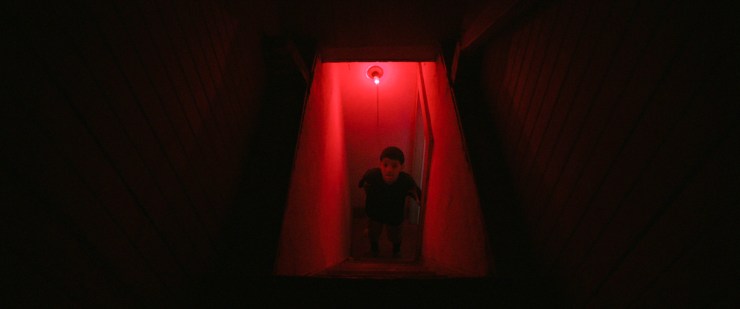Let’s cut straight to the chase: The Boy Behind the Door is a genuinely dark thriller. Harrowingly dark. More than just putting its child protagonists in constant peril, it broaches pedophiliac subject matter that might be too upsetting and off-putting for some. Consider this a trigger warning. First-time feature filmmakers David Charbonier and Justin Powell plunge straight into the heart of evil for their unrelentingly suspenseful thriller that fearlessly pushes boundaries.
Bobby (Lonnie Chavis) and Kevin (Ezra Dewey) are an inseparable pair of best friends. They do everything together, including play on the same little league baseball team. While out in a park tossing the ball, ticking down the hours until it’s time to head to their latest match, Kevin runs off after the ball. He doesn’t come back. When Bobby looks for him, an unseen assailant grabs him from behind and brutally knocks him unconscious. Bobby wakes up later, bound and gagged in a car trunk parked at a house in the middle of nowhere. He frees himself and starts to make a run for it until he hears Kevin’s screams. Bobby chooses to return and save Kevin, putting their friendship to the ultimate, most dangerous test.
It gives a unique and intense spin on the home invasion. The constant ratcheting of tension leaves you alternating between edge-of-your-seat panic and cringe-worthy repulsion; this thriller isn’t afraid to put its children through absolute hell. As Bobby tiptoes through the labyrinthine halls of this strange, sprawling home to avoid his kidnappers, the threat of discovery is oppressive. Because Bobby is a child, he’s prone to clumsy and naïve-based mistakes that usually results in close brushes with danger at best and disturbing violence at worst.

Charbonier and Powell know how to block a scene and use sound design to maximize suspense, and how to keep applying the pressure at a steady clip. More importantly, when they start revealing more about the kidnappers’ motivations for stealing the boys, it’s daunting and repulsive, but never gratuitous or overly explicit. It’s subtle enough to still pack a severe gut-punch without veering too far into exploitive territory. Considering the taboo subject matter, that’s a fine line to walk.
Perhaps most impressive of all is just how much rests on Chavis’s young shoulders for the film’s overall success, and how he pulls it off with ease. Bobby is the audience proxy and the unwitting hero. In a film mostly devoid of dialogue, much of the dread, intensity, and internal turmoil is relayed through Chavis’s nuanced expressiveness. One shocking encounter with an evil man is rendered all the more potent because of Bobby’s palpable fear. Without a word, the young actor can convey a profound struggle with mortality, both for himself and his attacker, and it’s effective.
The filmmakers inject a few twists and surprises, while making it abundantly clear that they’re unafraid to kill their darlings – or ruthlessly harm them- and nothing about their debut feels safe. It’s a taut white-knuckle thriller, made even bolder by the hero’s age. Charbonier and Powell bookend their thriller with more peaceful, art-house scenes that establish the boys’ bonds, but they’re too jarringly peaceful compared to the rest of the movie. They’re not needed, either; Chavis and Dewey’s performances more than sells their characters’ friendship. Though, I suppose it’s nice to offer both them and the audience a nice momentary reprieve before and after the raging storm. Because after enduring this unrelentingly intense, shockingly dark thriller, you’re going to need to catch your breath. Charbonier and Powell created one impressively ballsy debut, marking themselves as filmmakers to watch right out of the gate.
The Boy Behind the Door made its World Premiere at Celebration of Fantastic Fest.

